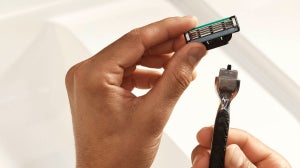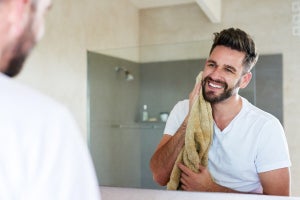
Today in the UK, 56,780 prostate cancers and 2,538 testicular cancers are diagnosed each year according to Movember. Their survey also points out the difficulty for men to discuss their health problems with those around them. "In the event of a physical problem, 66% of respondents said they would only talk to a family member and most often their spouse. Given these figures, it is important to raise awareness and to bear witness.
This is why the brands Gillette and King C. Gillette are committed to the Movember association, which works each year to raise funds for medical research and to raise public awareness of male pathologies. The earlier prostate cancer is detected, the better the chances of a cure. Hence the importance of listening to your body and getting tested, as Philippe explains. Now aged 60, he was diagnosed with locally advanced prostate cancer five years ago. He tells us about his journey.
How did you know you had prostate cancer?
Several symptoms could have tipped me off. For example, I had a very frequent urge to urinate and my urine stream was very weak. The pain at the moment of ejaculation was also recurrent. I thought it was fatigue or cystitis. I had also received a balloon in the intimate area a few weeks before, I thought that this might be related and that it would eventually pass.
Did you wait a long time to see a doctor?
Almost six months. I made a lot of excuses for my pain. I was probably afraid to know the truth and I didn't want to be vulnerable with my family. In fact, when I finally decided to see a doctor after finding blood in my urine, I didn't even tell my wife. I was uncomfortable with the idea of her knowing that I was going to show my penis or have a rectal exam. I preferred to be alone with my anxieties.
Did you think it might be prostate cancer?
It had crossed my mind. But two-thirds of cases occur after the age of 60. I was 55 at the time, and I thought I was too young to suffer from this type of pathology. My doctor had never alerted me to the subject or encouraged me to go for regular screening. With my friends, it was not a subject we discussed either.
The diagnosis came after a digital rectal exam to check the size of my prostate, a blood test for Prostate Specific Antigen (PSA) - the substance the prostate produces - and a prostate biopsy.
How did you react?
The world fell apart, I thought I was going to die, especially as it was advanced cancer. My first thoughts were for my children and my wife. Was I living my last moments with them? And if I did make it, what would my life be like? Was my wife going to leave me? A multitude of questions went through my head in a few seconds.
Did you tell your family and friends straight away?
I waited until the next day to tell my wife. It was very difficult to talk to her. In addition to the fear, anxiety and suffering, I had a huge loss of self-confidence. I felt trapped in the role of husband and man that I had built for myself. I didn't want to be vulnerable, let alone tell her that I was suffering from an illness that affected my intimacy.
Were you disappointed or pleasantly surprised by the reactions of your relatives?
My wife and children have been unfailingly supportive. The illness has brought us together, and today we are closer than ever. Among my friends, things are different. The expressions of love and support have not always come from the people I expected. Some were embarrassed, afraid of not knowing what to say or of being awkward and preferred to take a back seat. I received apologetic messages after my operation, especially from my best friend, who was sorry that he had not been able to get past his modesty.
When you find out you have cancer, you also have people who put themselves in the role of a life coach and immediately adopt a combative language. "It's healing well today!", "You have to fight, you have to be brave". I think we have to stop these injunctions to be strong. It was a double whammy for me as I was already struggling to verbalise and express my feelings. I needed someone to acknowledge my suffering and admit that not everything was going to work out.
You chose to have surgery to limit the risk of recurrence. What were your main fears?
My cancer was quite advanced, so the main option for saving myself and limiting the risk of recurrence was a prostatectomy. But by removing the prostate and any affected nodes, I was also taking the risk of being impotent or incontinent for the rest of my life.
I knew that after this type of operation the vast majority of patients were still alive after 5 years, I was rather reassured on this point by the medical profession. On the other hand, I was terrified of living with a nappy or of my wife leaving me to find sexual pleasure with another man. It was also a narcissistic wound for me because it affected my sexual organs and therefore my masculinity.
Just over five years after the operation, how are you doing?
I am in complete remission. I have also been very lucky because I have retained my "abilities". Everything works, except that I no longer secrete sperm. My erections are not like they used to be, but they still work. In this respect too, my wife and I have become closer. Dialogue and listening have been essential to resume sexual activity. At almost 60, we have rediscovered each other.
Why do you want to testify?
I want to show that there is a life after the diagnosis and that it can be very beautiful. I am far from being an isolated case, yet it is a testimony that we still hear very little in our society. We need to lift the veil on this disease and make it easier for people to speak out. In my opinion, modesty and the myth of virility that many men are prisoners of are some of the obstacles to cancer screening.
*The people on the image banner do not represent the interviewee (Philippe) and the blogger (Camille) for confidentiality reasons.









